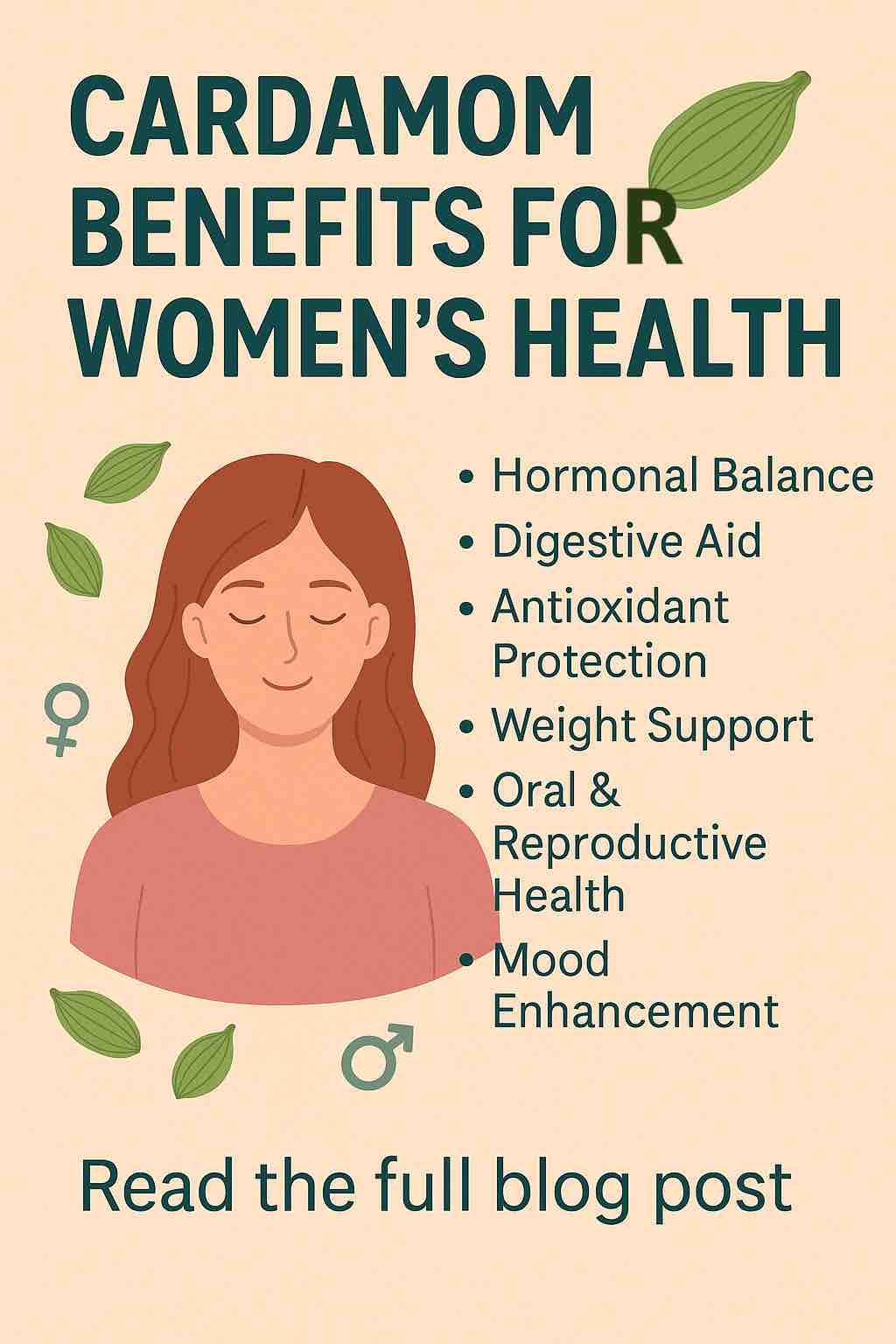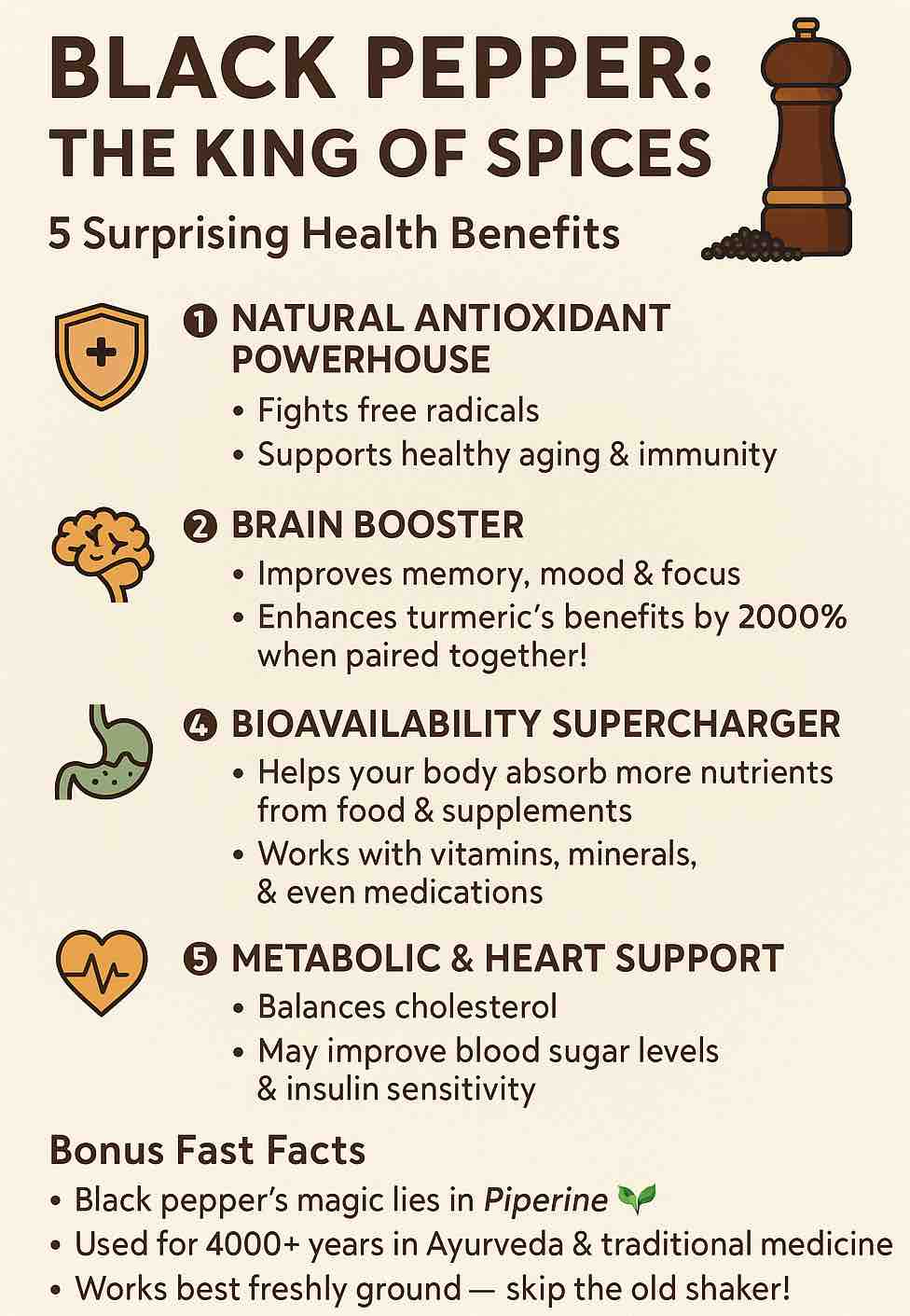
From the aromatic steam of a chai kettle to the delicate scent of Middle Eastern sweets, cardamom has a way of turning simple moments into sensory experiences. But behind its alluring flavor and ancient mystique lies something even more remarkable—its profound impact on women’s health and well-being.
Often dubbed the “Queen of Spices,” cardamom is more than a kitchen staple. It’s a quiet healer, offering a bouquet of benefits tailored to the intricate rhythms of the female body. Let’s dive into how this tiny green pod supports women through cycles, stages, and everyday stressors.
A Brief Introduction: Cardamom’s Roots and Legacy
Native to the lush forests of India and Sri Lanka, cardamom has graced spice routes and royal courts for over 4,000 years. Revered in Ayurveda, Unani, and Traditional Chinese Medicine, it has been used to balance doshas, freshen breath, aid digestion, and even uplift the spirit.
Fast forward to today, and modern science is catching up, highlighting cardamom’s antioxidant, anti-inflammatory, antimicrobial, and mood-regulating properties.
1. Hormonal Harmony: Supporting Menstrual and Menopausal Health
Hormones are at the heart of many aspects of a woman’s well-being—from energy levels and mood to skin clarity and fertility. Cardamom contains phytoestrogens, plant-based compounds that gently mimic estrogen in the body. These natural allies can be beneficial during both menstruation and menopause.
🌿 How Cardamom Helps:
- Eases menstrual cramps with its natural antispasmodic effects.
- Soothes mood swings and irritability, thanks to its warm aroma and nervine properties.
- During perimenopause and menopause, it may help ease hot flashes and mood instability.
💡 Try this: Brew a cardamom-ginger tea during your cycle to soothe cramps and bloating.
Also Read: The Revitalizing Brew: Unveiling the Benefits of Cardamom Tea
2. Gut Guardian: Aiding Digestion and Reducing Bloat
Women are more prone to digestive discomfort, especially during hormonal changes. Cardamom is a time-honored carminative, helping ease gas, indigestion, and sluggish digestion.
🌿 How Cardamom Helps:
- Stimulates the production of digestive enzymes.
- Relieves nausea, including morning sickness during early pregnancy.
- Reduces bloating and gas, particularly useful during menstruation or post-meal heaviness.
🍵 Digestive Tip: After meals, chew on a pod or sip cardamom-infused warm water to support digestion.
Also Read: Teas for Digestion, Bloating, and Gut Health
3. Skin Deep: Detox, Glow, and Antioxidant Armor
Thanks to its high content of flavonoids and essential oils, cardamom is a natural detoxifier that helps flush out toxins and supports radiant skin from within.
🌿 How Cardamom Helps:
- Neutralizes free radicals, reducing signs of aging.
- Aids liver function, supporting hormonal clearance.
- Helps maintain clearer skin, especially when hormones are fluctuating.
🌸 Beauty Ritual: Add a pinch of cardamom powder to your herbal tea to support your natural glow.
Might Want to read: Collagen-Rich Foods: Top Choices for Glowing Skin
4. Weight Balance & Metabolism Boost
Balancing weight can be more complex for women, especially with conditions like PCOS or thyroid imbalance. Emerging research suggests cardamom may support healthy metabolism and insulin regulation.
🌿 How Cardamom Helps:
- Gently enhances fat metabolism.
- Improves insulin sensitivity, useful for women with PCOS.
- May reduce inflammation-linked weight gain.
🍯 Wellness Tip: Mix cardamom powder with cinnamon and honey in warm water—an age-old tonic for metabolic support.
Do Read: Morning Metabolism Boost: 5 Green Tea & Spice Infusions for Weight Loss
5. Feminine Vitality: Oral Health and Reproductive Wellness
Good health starts in the mouth, and cardamom has long been used to freshen breath and support oral hygiene. But its benefits reach deeper—into the realms of libido and reproductive vitality.
🌿 How Cardamom Helps:
- Acts as a natural antiseptic in the mouth.
- Promotes healthy circulation, enhancing libido.
- Traditionally used as an aphrodisiac and uterine tonic.
💋 Quick Fix: Keep cardamom pods in your bag to freshen breath naturally and boost alertness.
Might enjoy: Spice It Up in Bedroom – 5 Natural Spices that work as Aphrodisiacs as per Ayurveda
6. Mindful Moments: Uplifting Mood and Easing Stress
Women often carry multiple emotional roles—caregiver, professional, friend, mother—which can lead to mental fatigue. Cardamom’s essential oil has been shown to have mood-enhancing and calming effects, making it an ideal support for mental wellness.
🌿 How Cardamom Helps:
- Balances nervous system activity.
- Helps reduce anxiety and mental fatigue.
- Enhances clarity and focus when used in aromatherapy.
🧘 Self-care idea: Diffuse cardamom essential oil during meditation or mix a drop with a carrier oil for a neck massage.
How to Enjoy Cardamom Daily
Cardamom isn’t just medicinal—it’s delicious. Here are a few gentle ways to weave its magic into your routine:
- Morning tea blend: Combine with ginger, cinnamon, and fennel.
- Golden milk: Add to turmeric lattes for added warmth and digestion support.
- Smoothies and oatmeal: A pinch of powder adds depth and digestive aid.
- Sweets and baked goods: Works wonderfully in date balls, banana bread, and rice pudding.
Also Read: Spice Up Your Electrolyte Game: 5 Refreshing Recipes with Cardamom, Cloves, and Coconut Water
Cautionary Notes
Though cardamom is generally safe, women who are pregnant or on medications should consult their doctor before using large quantities or essential oils. Moderation is key, especially in supplement form.
Final Thoughts: A Tiny Spice with Immense Power
In a world that often demands more than it gives, cardamom is a gentle, grounding ally. Whether you’re nurturing hormonal balance, navigating stress, or seeking radiant health, this ancient spice brings both comfort and strength. Rooted in tradition and now supported by science, it offers a fragrant path to wellness, tailored beautifully to the unique needs of women.
So the next time you savor a cup of chai or take a bite of cardamom-laced dessert, remember—you’re not just indulging your taste buds. You’re inviting centuries of healing wisdom into your life.
FAQs: Cardamom Delights – Women’s Health and Well-being
1. Can I consume cardamom every day?
Yes, moderate daily consumption of cardamom is generally safe and beneficial. Using it in tea, cooking, or as a breath freshener is a gentle way to enjoy its benefits regularly.
2. How much cardamom should I take for health benefits?
About 1–2 grams (roughly 2–3 pods or ¼ to ½ teaspoon of powder) per day is enough to support digestion, metabolism, and mood. For therapeutic use, consult a healthcare provider.
3. Is cardamom safe during pregnancy?
In small culinary amounts, yes. It can help reduce nausea and bloating. However, avoid high doses or concentrated essential oils unless approved by your doctor.
4. Can cardamom help with PMS symptoms?
Yes. Cardamom’s anti-inflammatory and mood-lifting properties may ease cramps, irritability, and bloating associated with premenstrual syndrome.
5. Does cardamom help with PCOS?
It may support PCOS management by improving insulin sensitivity and reducing inflammation, especially when combined with a healthy lifestyle. It’s not a cure but a helpful natural aid.
6. How does cardamom affect digestion?
Cardamom stimulates digestive enzymes, reduces gas and bloating, and helps ease nausea, making it an excellent post-meal remedy or addition to herbal teas.
7. What’s the best way to use cardamom for mental clarity or stress relief?
Try inhaling cardamom essential oil via a diffuser, or drinking cardamom tea during moments of stress. Its scent and warming qualities help calm the nervous system.
8. Can cardamom improve skin health?
Yes. Its antioxidants help detox the body, reduce oxidative stress, and support hormonal balance—factors that contribute to clearer, healthier skin.
9. Is it safe to take cardamom supplements?
Cardamom supplements are available, but it’s best to use whole pods or powder in food and drinks unless advised otherwise by a healthcare provider. Always check for quality and dosage.
10. How do I know if I’m consuming too much cardamom?
Excessive intake may cause mild side effects like nausea or diarrhea. Stick to small, regular amounts unless advised by a professional for specific conditions.










